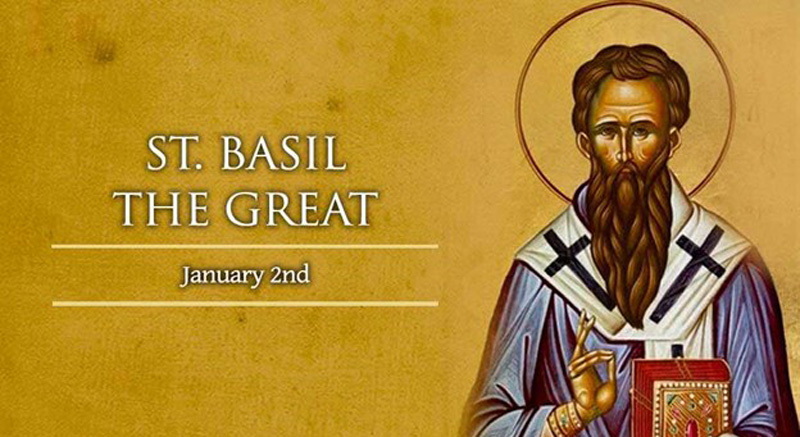(329-379)
Basil was born in Caesarea, the capital of Cappadocia.
His family was quite remarkable having produced six saints over three generations. His uncle was a bishop and later two of his brothers would become bishops. He received a fine education in Caesarea, Constantinople and Athens that would have set him up to follow his father as a lawyer and orator. Returning home, he eventually was influenced by his sister Macrina who herself would one day become an abbess. Basil and a group of friends subsequently established a monastic settlement on the family estate in Pontis.
In 357 he toured the monasteries of Egypt and in 360 was involved with the Cappadocian bishops in a synod in Constantinople. He became upset with the acceptance of the Arian Creed which even his own bishop supported. When that bishop died in 362, Basil was ordained and became an assistant to the new bishop, Eusebius. However, the two men disagreed on doctrine and Basil left to go to Annesi.
In 365 Basil was called back to Caesarea to defend the church against Arianism and its supporter, the emperor Valens. Basil and his peers promoted the doctrine, “three persons (hypostases) in one substance (ousia),” thus preserving unity and the necessary distinctions in the theological concept of the Godhead. When Eusebius passed away in 370, Basil succeeded him to the objections of some of the other bishops.
As bishop of Caesarea, Basil had founded charitable institutions to aid the poor, the ill and travelers. When Valens passed through Caesarea in 371, Basil dramatically defied his demand for submission. But in 372 Valens divided the province, and Basil considered this a personal attack, since Anthimus of Tyana thus became metropolitan for the cities of western Cappadocia. Basil countered by installing supporters in some of the border towns — St. Gregory of Nazianzus at Sasima and his own brother St. Gregory at Nyssa. This tactic was only partially successful, but Basil escaped the attacks that Valens launched on orthodox bishops elsewhere.
Basil’s numerous and influential writings stemmed from his practical concerns as monk, pastor, and church leader. The Longer Rules and Shorter Rules (for monasteries) and other ascetic writings distill the experience that began at Annesi and continued in his supervision of the monasteries of Cappadocia: they were to exert strong influence on the monastic life of Eastern Christianity. Much of what he promoted is still practiced today in the eastern Church. A notable feature is Basil’s strong preference for the monastic life, in which brotherly love can be practiced, as opposed to that of the hermit.
Basil’s sermons deal mainly with ethical and social problems. One of the best known, the Address to Young Men, defends the study of pagan literature by Christians (Basil himself made considerable critical use of Greek philosophical thought). In the Hexaëmeron (“Six Days”), nine Lenten sermons on the days of the Creation, Basil speaks of the varied beauty of the world as reflecting the splendor of God. Against Eunomius defends the deity of the Son against an extreme Arian thinker, and On the Holy Spirit expounds the deity of the Holy Spirit implied in the church’s tradition, though not previously formally defined.
Basil is most characteristically revealed in his letters, of which more than 300 are preserved. Many deal with daily activities; others are, in effect, short treatises on theology or ethics. Several of his Canonical Epistles, decisions on points of discipline, have become part of the canon law of the Eastern Orthodox Church. The extent of Basil’s actual contribution to the magnificent series of eucharistic prayers known as the Liturgy of St. Basil is uncertain. But at least the central prayer of consecration (setting apart the bread and wine) reflects his spirit and was probably in use at Caesarea in his own lifetime.
Adapted by A. J. Valentini from: Hardy, E. R. (n.d.). St. Basil the Great | Biography, Facts, & Legacy. Encyclopedia Britannica. Retrieved Dec. 24, 2020, from https://www.britannica.com/biography/Saint-Basil-the-Great
